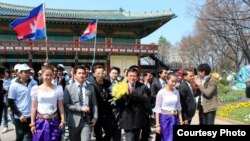Cambodian workers in South Korea say high wages there have helped their families back in Cambodia, but many here say they would rather work back home, under the rights circumstances.
An estimated 30,000 Cambodians work throughout South Korean farms, factories and homes, earning far more than they could back in Cambodia. Workers in South Korea earn up to $2,800 per month here.
But in interviews with VOA Khmer, workers say they were pushed to move thousands of miles away from family because there are not enough opportunities in Cambodia.
Sithith Sovann, 34, who now works in Seoul, said he left Kampong Cham province to find work here. He appealed to the government to raise wages in Cambodia so that others won’t have to make such a move. “We have to have enough to spend on the family,” he said in an interview with VOA Khmer.
“My migration was to improve myself, because we can’t be our parents’ successors, farming or doing traditional work,” he said. “If I hadn’t migrated, I may not have been able to change my family’s economics.”
Sok Vantha, 28, from Kampot province, has worked in South Korea for two years. At his home, there was not enough work, he said in Skype interview. “I finished university and my first salary was only $70 per month,” he said. “It did not match the price of goods in the market. I could not survive, so I decided to migrate.”
His salary was similar to that of many Cambodians in the workforce. The garment industry, which employs up to 350,000 people, has a wage of about $60 per month, though that is slated to increase to $80 per month. Workers often protest these wages, saying they have not kept up with the price of consumer goods.
In a recent speech, Prime Minister Hun Sen said the wages are improving. At $80 per month, he said, some workers will be able to send money home. He called promises of greater wages by his political opponents “empty.” But opposition lawmakers say Cambodian wages are not advancing enough to keep up with the cost of living in the country.
In South Korea, Sok Vantha said he has been able to work as a laborer and earn good money, but he encouraged Cambodians back home to study hard and be engaged in the Cambodian political process.
“When one understands politics and votes for the right representatives, they can lead the country properly,” he said. “Then there will be higher salaries and plenty of jobs.”








